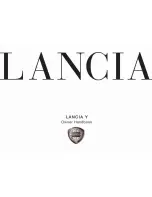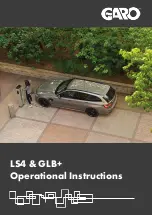
WARNING! (Continued)
•
Be sure everyone in your vehicle is in a
seat and using a seat belt properly. Occu-
pants, including the driver, should always
wear their seat belts whether or not an air
bag is also provided at their seating posi-
tion to minimize the risk of severe injury or
death in the event of a crash.
•
Wearing your seat belt incorrectly could
make your injuries in a collision much
worse. You might suffer internal injuries, or
you could even slide out of the seat belt.
Follow these instructions to wear your seat
belt safely and to keep your passengers
safe, too.
•
Two people should never be belted into a
single seat belt. People belted together can
crash into one another in a collision, hurt-
ing one another badly. Never use a lap/
shoulder belt or a lap belt for more than
one person, no matter what their size.
WARNING!
•
A lap belt worn too high can increase the
risk of injury in a collision. The seat belt
forces won’t be at the strong hip and pelvic
bones, but across your abdomen. Always
wear the lap part of your seat belt as low as
possible and keep it snug.
•
A twisted seat belt may not protect you
properly. In a collision, it could even cut into
you. Be sure the seat belt is flat against
your body, without twists. If you can’t
straighten a seat belt in your vehicle, take it
to your authorized dealer immediately and
have it fixed.
•
A seat belt that is buckled into the wrong
buckle will not protect you properly. The lap
portion could ride too high on your body,
possibly causing internal injuries. Always
buckle your seat belt into the buckle near-
est you.
•
A seat belt that is too loose will not protect
you properly. In a sudden stop, you could
move too far forward, increasing the pos-
sibility of injury. Wear your seat belt snugly.
(Continued)
WARNING! (Continued)
•
A seat belt that is worn under your arm is
dangerous. Your body could strike the in-
side surfaces of the vehicle in a collision,
increasing head and neck injury. A seat belt
worn under the arm can cause internal
injuries. Ribs aren’t as strong as shoulder
bones. Wear the seat belt over your shoul-
der so that your strongest bones will take
the force in a collision.
•
A shoulder belt placed behind you will not
protect you from injury during a collision.
You are more likely to hit your head in a
collision if you do not wear your shoulder
belt. The lap and shoulder belt are meant to
be used together.
•
A frayed or torn seat belt could rip apart in
a collision and leave you with no protec-
tion. Inspect the seat belt system periodi-
cally, checking for cuts, frays, or loose
parts. Damaged parts must be replaced
immediately. Do not disassemble or modify
the seat belt system. Seat belt assemblies
must be replaced after a collision.
19
Summary of Contents for Viper 2017
Page 2: ......
Page 3: ......
Page 5: ...2...
Page 45: ...42...
Page 100: ...Overview 8 4 NAV Temperature Controls 97...
Page 107: ...Operating Tips Chart 104...
Page 113: ...110...
Page 180: ...8 MAINTENANCE SCHEDULES MAINTENANCE SCHEDULE 178 177...
Page 181: ...MAINTENANCE SCHEDULE Refer to the Service And Warranty Handbook for maintenance schedules 178...
Page 182: ...9 IF YOU NEED CONSUMER ASSISTANCE IF YOU NEED ASSISTANCE 180 179...
Page 184: ...181...
Page 185: ...182...
Page 186: ...10 INDEX 183...
Page 200: ...8...
Page 201: ......
Page 202: ......
Page 204: ...7 9 9 B 9 B...
Page 205: ...I B I...
Page 206: ......
Page 207: ......
Page 234: ...8 4 1 5 0 6 O v T Ry 2 E H O 7 E H 3 R 5 I2 8 R 2 4 2 9 5 O RO eI2 eR 5...
Page 247: ......
Page 282: ...X...
Page 384: ...F G H J 8 L H 9 M 9 G...
Page 385: ......
Page 386: ...2 3 4 5 67 8 9 7 9 9 B 8...
Page 387: ......
Page 388: ......
Page 389: ...Viper 1 7 Z D 1 2 6 A R A A A...
















































